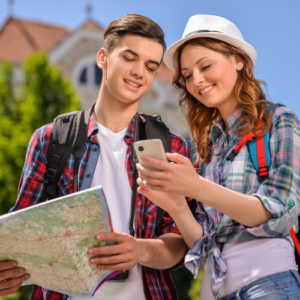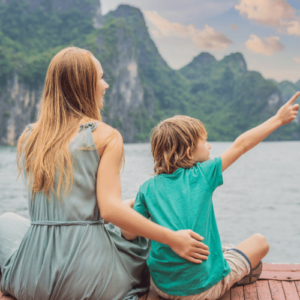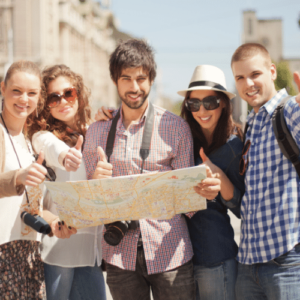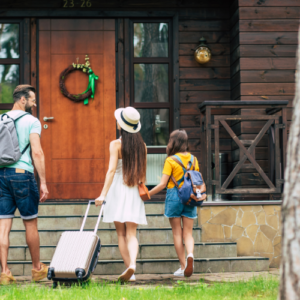Table of Contents
Tips To Win
“It is better to travel well than to arrive.” ~Buddha
Win…If you follow the advice of the Buddha, you will realize that the journey is the prize.

In other words, success is less important than the journey to it.
There are numerous contexts in which this quote is relevant. For instance, it implies that the value of education lies in its own pursuit rather than in the end result, such as a high grade or a specific level of success.
The same is true of interpersonal connections: the work of establishing and maintaining them is more important than any final destination.
Finally, this quote serves as a gentle reminder to take pleasure in life’s journey and value the lessons and experiences gained along the way.
We can find more meaning and happiness in life if we focus on the journey itself rather than just the end point.
I think we can all agree that there’s something special about getting to “somewhere” and knowing everything about it — the geography, the people, the culture, and the climate — in a way that’s impossible to do from 30,000 feet in the air.
A large part of the appeal of road trips for me is that they allow me to see new parts of my home country.
And it’s undeniable that having new experiences is what life’s all about. Furthermore, unlike material possessions, memories of past events can never be lost.
Every day, we have to face the challenge of figuring out how to benefit the most from our existence. Value is something that we as humans ascribe to the things we seek.
Each of us wants to believe that our efforts are making a difference. This is vital to our health, as it is through these aims that we gain the knowledge and maturity necessary for a happy and fulfilling life.
Following our passions teaches us about ourselves and the world in ways that are immeasurably valuable.
What could possibly be more exciting than going on an adventure? Getting away from the stresses of everyday life is one of the main reasons why traveling is so special.
It’s a great way to relax and take our minds off the stresses and anxieties we face at home. Different aspects of life present themselves to us at various points along the way.
We eat our way across the world and learn about different cultures, customs, and cuisines. Nothing like this would be possible back in our home country.
This is why going on a trip is so different from anything else you can do in your life. Moreover, travel has many advantages, including the enhancement of one’s health and the acquisition of new abilities.
Also, as we grow and develop as a result of our travels, we find greater meaning in our lives. Instead of trying to mash together the information in this article with real-world and travel-related anecdotes, let’s focus on the positive aspects of getting out of the house.
1. Traveling allows us to gain a better understanding of the world.
It is difficult to gain a complete understanding of the world if you never leave your hometown or country. You’ll never know what it’s like to share in the joys and sorrows of other cultures.

One could argue that you see these things in the media. Although positive stories about a country are often overlooked, the media tends to focus on its negative aspects.
Consider how the conflict in Syria has affected your view of the Syrian people and the country as a whole. The media facilitates the erection of barriers to communication and mutual comprehension.
The only way to get past this is to travel and see things with one’s own eyes.
Each nation may differ considerably from the others. Cultures, customs, and even languages can vary greatly between regions. Because of our experiences with other cultures, we can learn to accept others for who they are and to recognize that despite our differences, we are all fundamentally the same.
We may not be physically similar, but our aspirations and dreams are the same. People of all backgrounds cherish their kids, take great pride in their traditions, and do their best to provide for their families.
Our shared experiences and perspectives are our common ground. The unique experiences we have while traveling help us become more accepting of others and of the world around us.
2. Travel forces us to examine and possibly alter our core values and principles in life.
You can never grow as a person if you never leave your comfort zone, so staying at home all the time is not a good idea. Only those in your immediate social circle will ever have an accurate gauge of how your home life stacks up against others’.
Through travel, we are able to see how other people around the world lead their daily lives. We get an idea of their values and perspectives on such things as family, work, education, the environment, and so on.

Our own worldviews and values may be called into question or altered as a result of this. New perspectives and experiences await us on our journey.
Because of this, excursions abroad are excellent educational opportunities. What you do with that knowledge is entirely up to you.
Skills you acquire while traveling will serve you well for the rest of your life, whether you’re learning a new language, trying out new activities, discovering new passions, or simply growing as a person.
3. Traveling allows us to meet new people and form new friendships.
The chance to meet interesting people from all over the world and make new friends is a major perk of traveling. What makes travel so worthwhile is when we can share our adventures with others.

At home, we rarely interact with strangers. We don’t have to go out of our way to meet new people because we have our existing network of friends and family. As a result, we tend to be less receptive to meeting new people and striking up new connections.
Meeting new people is a breeze when you’re traveling. Whether we are in the hotel bar or out exploring, there are always other people around.
We can bond over shared experiences of eating, traveling, listening to, and experiencing new cultures. In addition, we share many of the same passions and principles, which makes for more natural and interesting conversation.
The bonds and memories we form with people we’ve only known for a short time can often endure for the rest of our lives. Because of the interconnected nature of modern society, these bonds are more vital than ever. They could lead to exciting new opportunities in the years to come.
4. Traveling promotes personal development.
When we travel, we often have to do things that are out of our usual routine. Different from our usual routine, these new situations force us to leave our comfort zones, which helps us grow as people.
It’s important to remember that every trip presents its own set of difficulties. When you’re on your own, you might have to learn to be more self-reliant and responsible, for instance.
You’ll learn a lot about yourself as you navigate these challenges, including your abilities, limitations, preferences, etc. Having this kind of insight into yourself is crucial in terms of developing as a person and coming into your own.
Finally, travel is a plethora of new experiences rolled into one. It’s impossible to get the same kind of life lessons from staying put that you would from seeing the world. Consequently, it is recommended that you go on an adventure.
Keys for a Nice Road Trip
I find it so inspiring that the keys to a good road trip are the same as the keys to a good life. Now let’s take a look at them

1. Be well prepared.
While traveling: Make sure the car has gas, and pack a spare outfit, maps, water, a snack, and your sense of adventure before hitting the road.
In real life: Expect the unexpected, but make sure you always have food, water, a roof over your head, and people to lean on.
Get yourself set up financially, make sure you have people you can count on to help you out, and educate yourself so you can take care of yourself in any situation (assertiveness, emotional regulation skills, and boundary setting).
2. Maintain flexibility.
While traveling: Anything can and probably will occur. Avoid unnecessary anxiety by lowering your standards for success. Keep your options open and your mind unguarded, and be receptive to new information.
In real life: According to the proverb, if you want to make God laugh, you must tell him your plans.
To be able to adapt to any situation, we must train ourselves to keep an open mind and heart, be aware of our own biases, and work toward honesty and openness with compassion.
3. Maintain a nonjudgmental attitude.
While traveling: One of the great things about traveling is that you get to meet people you would have never known about otherwise.
It’s impossible to have a meaningful conversation with someone if you’re carrying around preconceived notions about them. Being nonjudgmental is easier in theory than in practice.
In real life: Be gentle with yourself for harboring judgments—we all do—but work to become aware of them and to recognize judgmental attitudes as a signal that you need to examine your own inner process.
4. Desire to be in your current location.
While traveling: It is not so much about where you’re going as it is about what you see and do. Forget about meeting any deadlines and just go for a drive.
If you’re just looking for a scenic route rather than a practical one, take the one that winds through the hills. You won’t be sorry you did it, and if it doesn’t work out, you can always try something else.
In real life: Rather than a desire to be somewhere else, cultivate deep acceptance and curiosity about where you are. Objectives are admirable, but being present is equally crucial. In the here and now, things actually happen.
5. Make sure to document everything.
While traveling: Photos, diaries, and even Facebook status updates can help you look back on your travels and reflect on how far you’ve come.
In real life: Keeping a journal can help us see how far we’ve come and where we’re still stuck.
6. Pay close attention.
While traveling: It’s essential to stay in the here and now if you want to make the most of your experience.
Everything from the air’s temperature and texture to the scents it carries and the sights, sounds, and landmarks it displays to the people and animals it shares space with.
Don’t try to cling to anything, because you can’t; instead, absorb what you’ve been through.
In real life: Allow the good things that happen, even the small ones, to sink in for at least thirty seconds by sitting with the feelings of those moments.
The chemical makeup of your brain can be altered in this way, allowing you to take greater pleasure in positive experiences.
7. Maintain a sense of humor.
While traveling: Keep in mind that, no matter how bad things get, you can always look back and laugh. At first, it was annoying to have to spend the night in a car in a deserted motel parking lot; the next morning, when the car wouldn’t start, was another story entirely.
But at least we can joke about it with our loved ones.
In real life: Even in the darkest of times, remember that the bad feelings will pass and the laughter will return. If you can’t find any laughs anywhere else, it might help to rent a comedic film or attend a comedy show.
Physical and emotional health can both benefit from the endorphins released during a good laugh.
Be Safe!
Letting Go! 90 Methods To Ease Emotional Pain
16 Mindful Ways To Stay Present & Focused In a Digital Word
10 Signs That Everrything Is Okay With You ( Or Me)
Predictions And Comments For The 12 Zodiac Signs In April 2023
otes in our website: https://psytify.com/quotes/
More quote resources: https://en.wikiquote.org/wiki/Main_Page

“Thought is only an abstraction representing a fraction of what is.” ― Lenfantvivant
”Widen The Window”(2019) Book Summary
Summary of “Atomic Habits” (2018)

